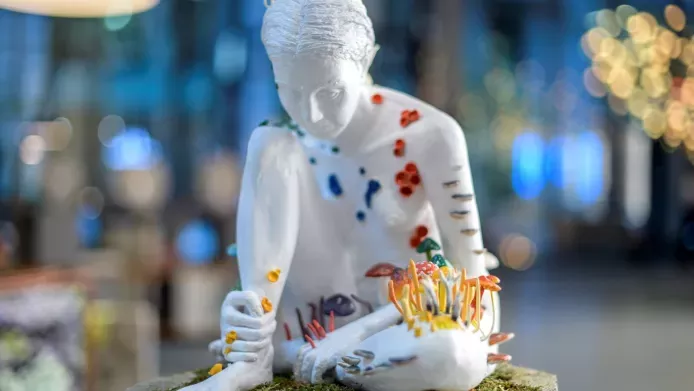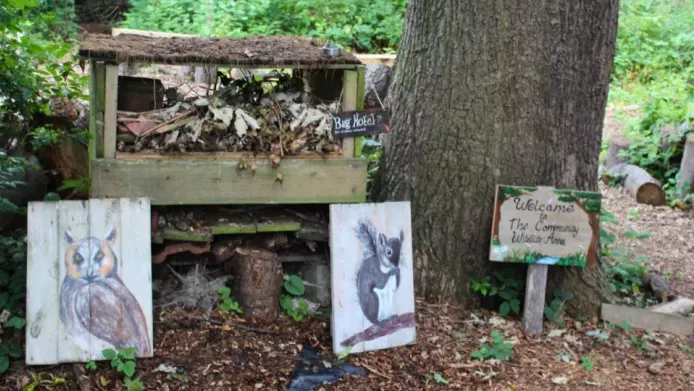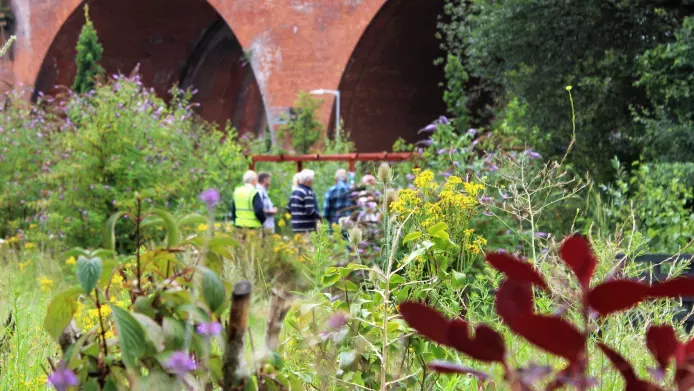We spoke to project leader Ruth, teacher at Ralph Thoresby School in Leeds. They applied to the Grow Wild Community Programme to support their ‘Growing Wellbeing Project’, a collaborative project between Ralph Thoresby School and the Adult Social Care group at Holt Park Active in Leeds.
After doing a qualification in social and therapeutic horticulture with Thrive I realised I wanted to set something up to do with gardening in school. The Head Teacher gave the go ahead so I went across to Holt Park Active next door to Ralph Thoresby School and asked if we could come and work in their garden.
We hoped the grant and training provided by Grow Wild could develop the garden into a more wildlife friendly space, supporting activities to bring adults and students together in learning about UK native plants and biodiversity.
The garden is used by the Adult Social Care group at Holt Park Active, a day centre providing groups and activities in a safe and supportive environment for elderly and physically impaired individuals. A collaboration sounded perfect because it would benefit both groups, so we started as a small project doing some planting. Students from year groups 7-10 now visit each week to plant flowers, grow vegetables, make the garden more wildlife friendly and join a cooking group for all the participants.

‘When I started, I enjoyed being able to boost my confidence and having a quiet safe space outside the school to go to and make new friends’
Ralph Thoresby School Student
For the students the project is about two main things: downtime in a calm space away from school, to restore attention and return to school feeling refreshed. Also building confidence from working and communicating with the elderly and physically impaired people, and from a sense of achievement gained by helping in the garden.
'The students absolutely love it. They really value this time out of school – it breaks up the day, is time to come out and do something therapeutic.’
Kirsty Maw - Ralph Thoresby Safeguarding Lead
Every single student has said in feedback about the garden group that they've built their confidence. It's nice seeing our students come out their shells, learning sign language, chatting, breaking disability boundaries and really getting along with the adults. It's great for adults attending Adult Social Care services too, many of them mention being lonely and they like seeing the young people. It works nicely because some of the adults are knowledgeable about gardening, so they tell the kids what to do. It's a really nice partnership.

‘For the older adults, it's new having the kids come down... They love everything about it, getting kids involved and showing them what we do.’
Julie - Adult Social Care Group
We’ve planted wildflowers and herbs to create a therapeutic space with a variety of colours, textures and scents. To improve biodiversity we’ve focused on perennials and plants that are good for pollinators, but we’ve also ordered native bulbs such as snake's head fritillaries (Fritillaria meleagris), wild daffodils (Narcissus pseudonarcissus), bluebells (Hyacinthoides non-scripta) Wild Garlic (Allium ursinum).
 Photo credit: Ruth Gillott
Photo credit: Ruth Gillott
We talk about pollinators a lot, have enjoyed doing bug hunts and have been gathering materials to create a bug hotel once we finish planting, in winter. There’s been a big increase in the number of pollinators and minibeasts in the garden. Now when the children have a science lesson about the importance of bees, the garden really brings the classroom to life for them.
It's been a nice surprise seeing the students get excited about the plants; some of them have really enjoyed planting, although I think they enjoy seed sowing less, because it’s a long wait between sowing and seeing flowers. Over the summer we did garden sessions within the school’s healthy holidays club, tending to the garden, and making fat balls for bird feeders. When we came back after the summer, the kids were really pleased when they saw how amazing it looked.
 Wildflower paper
Wildflower paper
This term we bought wildflower mixes to make seed bombs. It’s been popular, although I think the kids were slightly disappointed that they didn't explode! We plan to make lots of these, for students to take home, staff to sow in their gardens, and some for our garden. We’ve also made wildflower paper and bagged up seeds with instructions for sowing wildflowers. We gave these away at our school festival, accompanied by a display about our project with information on bees and wildflowers.
The Grow Wild project has given us a really clear focus and training has been really good too. Honestly, the whole experience has been amazing. Sometimes in the past we’ve been doing a bit of gardening here and there, whereas now we focus on wildlife and wildflowers.
Our future for the project involves expanding into another area behind the garden, currently unused council land containing five silver birches and an oak tree. The idea is to add wildflower beds where the sun shines through the trees and have wheelchair accessible paths leading from the garden into the new, wilder area.
’The garden looks fabulous now, it's beautiful. It's just like a secret garden...The kids have helped so much, painting and planting, I think they've loved the atmosphere.’
Julie - Adult Social Care group
It'll be a lovely for the students and adults to be able to go on nature walks. We hope to finish it by next summer and celebrate with an open day.
 Photo credit: Ruth Gillott
Photo credit: Ruth Gillott
Grow Wild's Community Programme



